In Afghanistan’s Northeast, a Call for Muslim Men to Stand Up for Women
Date:
Author: Hamayoon Sediqi
Kapisa, Afghanistan – People joining the HeForShe Campaign, including some who walked for hours to get to the venue, said Muslims have a religious duty to respect women and protect them from violence.
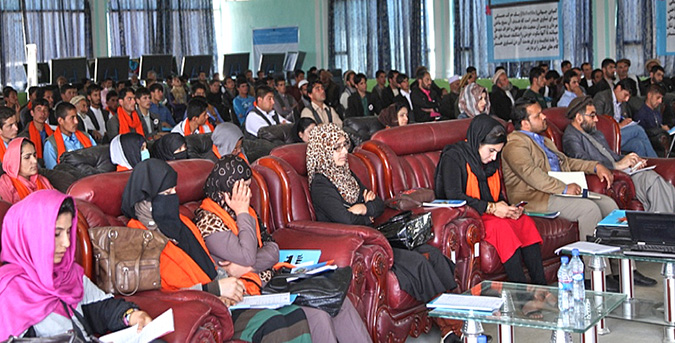
Government officials, members of civil society groups, religious leaders, and members of the public attended the 25 April launch of UN Women’s HeforShe campaign at the conference hall in Kapisa Province, in Afghanistan’s northeast. Kapisa was the 11th province of Aghanistan in which the campaign has been launched.
HeForShe is a global campaign that enlists men and boys to speak out and take action against discrimination and abuse against women and girls
Sayed Khalid Hashimi, the Governor of Kapisa Province, told UN Women, “As in the other 33 provinces, violence against women still exists in Kapisa, although luckily, the rate of violence against women here is very low. As Governor of Kapisa, I can promise that I and my team will work harder to make the HeForShe campaign successful so that every man will stand for women’s rights until the rate of violence against women has dropped.”
Among those attending the event in Kapisa were about 20 older people who had walked for hours from different districts of the province. They said they wanted to learn about women’s rights and share the message with others in their villages.
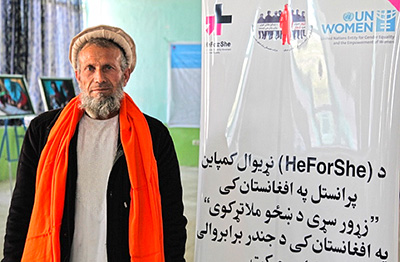
Mohammad Hanif, 56, traveled a long distance with his sons and grandsons. He said that the Prophet Muhammad had stopped people from committing violence against women and encouraged all Muslims to respect the rights of women and girls. Unfortunately, he said, some people treat women very badly because they are unaware of what their religion says about women’s rights. Mr. Hanif said that when he hears about violenct acts against women, he feels it is shameful for a Muslim. He said the Mullahs – the religious leaders -- have a duty to explain women’s rights to people because people pay attention to what they say.
“I don’t remember that I have done anything that caused my wife, daughters and daughters-in-law to feel sad or pained,” Mr. Hanif said. “I have also never allowed my sons to mistreat their wives and sisters. We all know that Islam has given both male and female equal rights, and it is for us to ensure that women and girls’ rights are properly met.”
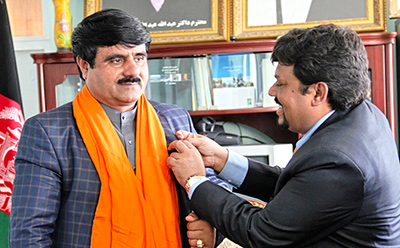
Aziz-u-Ilrahman Tawab, the Deputy Governor of Kapisa Province, said Islam is a religion of peace and it holds a special place for women. Islam does not accept any form of violence and injustice against women, and anyone who commits such acts is unaware of Islam, he said. He said the Prophet Mohammad was the first person to stand up against violence against women. Therefore, this is a duty of all Muslims.
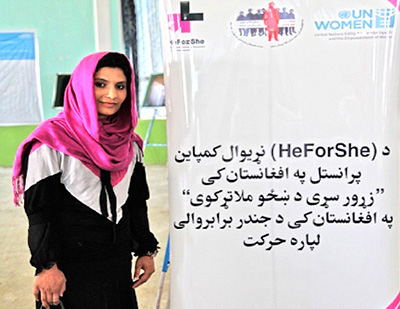
Sarah Searat, Director of the Women’s Social and Cultural Organization in Kapisa Province, told the audience that campaigns to raise awareness were needed.
“I can say that 90 per cent of the violence that happens against women is due to lack of awareness about the rights of women and girls,” said Ms. Searat, a student of journalism. “I myself have experienced different forms of violence at home, the university, the market and on the street. And I am sure that all women have experienced a form of violence at least once. Some people think that violence against women and girls is only beating, and this is not true. Violence has many forms, even using bad language or nasty words for a female is a form of violence.”
Ms. Searat asked that all men and boys try to put themselves in the shoes of women who had been deprived of their basic rights, or had bad language used against them, “How would you feel at that time?” she said. “My request is: Please stop violence against women and girls and help them to be an active part of the society.”
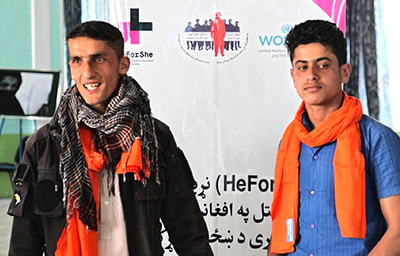
High school students Hamidullah, 19, and Abdul Latif, 18, who attended the event with many other students, said they spoke out whenever they see boys teasing girls on the streets, in the markets, and in other public areas. Students should be positive role models, they said, adding that they will encourage their classmates and friends to stand for women’s rights.
For more information
Please contact: Hamayoon Sediqi
National Information and Communications Officer, UN Women Afghanistan
Tel: +93 (0) 799 63 35 95 Email: [ Click to reveal ]